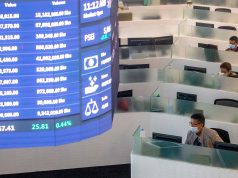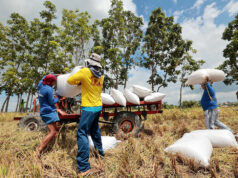Retail T-bond sale bares strong demand
By Karl Angelo N. Vidal
Reporter
THE GOVERNMENT saw strong demand during the sale of the retail Treasury bonds (RTB) to institutional investors on Tuesday in which the five-year debt papers fetched a higher coupon than in previous exercises.
In the rate-setting auction, the Bureau of the Treasury raised P113.772 billion against P121.807 billion in total tenders.
Strong demand from institutional investors prompted the Treasury to upsize its offer fourfold to P120 billion from P30 billion initially.
The bonds carry a coupon of 6.25%, compared to the 4.625% fetched for the five-year RTBs sold in November 2017, the 4.875% of the three-year instruments sold in June 2018 and the 6.142% five-year bond rate at the close of the secondary market yesterday.
The state raised P255.4 billion and P121.765 billion, respectively, in those two RTB exercises.
The RTBs are now offered to the general investing public through 21 authorized selling agents (list at: http://www.treasury.gov.ph/?p=24484) at denominations of P5,000 until March 8.
The bonds can also be bought online on the Web sites of Land Bank of the Philippines (LANDBANK) and Development Bank of the Philippines (DBP).
The latest debt papers, which will be issued on March 12, will mature in 2024.
Following the price-setting auction, National Treasurer Rosalia V. De Leon said that the Treasury was “extremely pleased” with the result of the coupon-setting exercise, which saw fourfold oversubscription.
“Based on the auction, there’s really strong demand coming from the institutional investors, given the results of the auction today,” Ms. De Leon told reporters on Tuesday.
“We see that investors view this as a last call to be able to get good rates because of the expectations that, eventually, rates will be trending downwards, with the inflation expectations to also continue to decline, particularly with the two bills that were passed by the administration — the rice tariffication and the amendments to the central bank act.”
The rice tariffication law signed by President Rodrigo R. Duterte on Feb. 14 liberalizes importation of the staple by replacing quantitative restrictions on rice imports with tariffs. This measure is expected to slash inflation by 0.7 percentage point.
Inflation clocked in at 4.4% in January, marking the third straight month of decline from a nine-year high of 6.7% in September and October. The Bangko Sentral ng Pilipinas now expects inflation to average 3.1% this year from 2018’s decade-high 5.2%.
Mr. Duterte had also signed into law earlier this month amendments to the central bank charter that boost monetary authorities’ ability to manage inflation and increased capitalization to P200 billion from P50 billion. It also restored the central bank’s authority to issue debt papers and expanded the list of financial businesses under its watch.
Ms. De Leon said total demand for the RTBs can reach as high as P200 billion by the end of the public offer. “We hope that we will be able to get half… That’s really the ambition… half of the offering would (come) from individual and retail investors,” she said.
Sought for comment, a bond trader said Tuesday saw a “great auction” as the Treasury “got what they wanted.”
“(The RTB sale) pretty much confirmed investor appetite on the five-year tenor,” the bond trader said in a text message.
The Treasury said in a press release that “[p]roceeds from the issuance of RTBs will form part of the Philippine government’s fund-raising efforts for its health services, educational programs and public infrastructure.” The state plans to borrow P1.189 trillion this year to help support plans for bigger spending on infrastructure and social services. Of the amount, 75% will be sourced domestically while the balance will be from foreign creditors.
LANDBANK and DBP are the joint lead issue managers for the 22nd RTB offer. They are also joint issue managers alongside BDO Capital & Investment Corp., BPI Capital Corp., China Bank Capital Corp., First Metro Investment Corp., RCBC Capital Corp. and SB Capital Investment Corp.
The Treasury is also studying an offer of renminbi-denominated “panda” bonds next quarter as well as yen-denominated “samurai” bonds three months afterwards.



